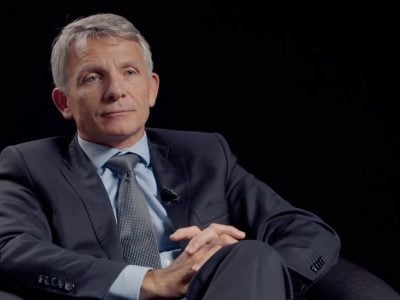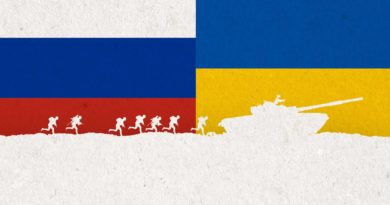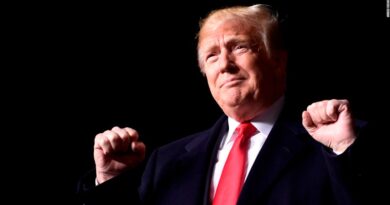“War in Ukraine, NATO and the USA Wanted to Overthrow Putin. Mission Failed.” Interview with Eric Denécé

All Global Research articles can be read in 51 languages by activating the Translate Website button below the author’s name (only available in desktop version).
To receive Global Research’s Daily Newsletter (selected articles), click here.
Click the share button above to email/forward this article to your friends and colleagues. Follow us on Instagram and Twitter and subscribe to our Telegram Channel. Feel free to repost and share widely Global Research articles.
Global Research Wants to Hear From You!
***
The conflict in Ukraine was deliberately provoked by the United States and NATO with the aim of weakening Russia and overthrowing Vladimir Putin’s government. In the expectations of Washington and the Atlantic Alliance, this move should have dragged Russia – with its immense natural resources – under Western influence. A necessary postponement also in view of a possible confrontation with China.
Collapse Russia is a failed goal. But Washington and NATO have achieved an equally important objective: to weaken Europe and cut its political and economic ties with Russia. Today, Europe is more than ever enslaved by Washington, dependent on its gas and arms supplies.
What might seem like the analysis of a Kremlin official is instead a profound and detailed vision that comes from the heart of Europe, from Paris. This analysis bears the signature of Eric Denécé, one of the leading Western experts in geopolitics and geostrategy, with a lot of experience gained in the field, under the tricolor flag of French intelligence.
Denécé now is the Director and Founder of the French Centre for Intelligence Studies (CF2R). During his career, Denécé previously served as Naval Intelligence Officer (analyst) within the Strategic Evaluation Division at the Secretariat Général de la Défense Nationale (SGDN). His operational experience, whether as an officer or as a consultant, led him to conduct operations in Cambodia among guerrilla forces, and in Myanmar to secure Total’s interests against the local guerrilla. He also served as a consultant to the French Ministry of Defence on projects concerning the future of the French Special Forces and South China Sea’s disputes. For years, he has served French and European companies on intelligence, counter-intelligence, information operations and risk management issues, in Europe and Asia.
Piero Messina (PM): More than 30 years ago Russia was assured that NATO would never extend its operational area. And then what happened?
Eric Denécé (ED): NATO’s lies date back to 1990, when the then US Secretary of State, James Baker, assured Mikaïl Gorbatchev at their meeting on February 9 that NATO would “never advance an inch eastwards”. This promise was not kept. Then, in March 1991, Western leaders again promised USSR leaders that NATO would not expand eastwards. The evidence of this lie is now documented, as confirmed by Roland Dumas, then French Foreign Minister, and Vladimir Fedorovsky, former Russian diplomat. NATO has constantly extended its influence in Eastern Europe, integrating new members. It continues to do so (Ukraine, etc.) and is even transforming itself into an anti-Chinese alliance, by deploying in the Indo-Pacific.
PM: From NATO Headquarters in Brussels they make it known that from their point of view the Atlantic Organization has in reality simply implemented the requests of Sovereign States that had expressed the desire to join that Pact. Is it a credible reconstruction?
ED: Such a situation would not have arisen if NATO had been dissolved after the threat of the Warsaw Pact had disappeared. But the Americans never had any intention of doing so, because the Alliance was a formidable instrument of political, diplomatic and military influence for controlling European states, almost all of which – with the exception of France and the UK – refused to make the minimum effort to ensure their own security.
Nor should we forget another essential aspect. By steadily enlarging NATO, and reneging on commitments made to Moscow, the Americans have denied Russia the notion of a space of influence in its near abroad, even though they themselves established the Monroe Doctrine in 1823, which “forbids” the intervention or interference of any foreign state on the American continent, on pain of American retaliation. This systematic policy of “double standards” has finally exasperated the Russians, who consider that the West does not respect the international laws it has enacted and imposed on the world when it deems it profitable to its interests, but continues to condemn those who do.
PM: The last years of Ukraine’s history are very complex. What happened from 2004 to 2014? Are we able to make a list of the external actors who contributed to changing the course of that country’s history?
ED: In 2004, in the wake of the “color revolutions”, Ukraine saw a major popular movement denouncing widespread fraud in the second round of the presidential election. While the pro-European candidate Viktor Yushchenko was leading in the exit polls, the electoral commission declared the victory of Prime Minister Viktor Yanukovych, supported by the outgoing president, Leonid Kuchma, and Vladimir Putin. Massive demonstrations were held to demand the annulment of the election results and the organization of a new ballot. On December 3, 2004, the Ukrainian Supreme Court annulled the presidential election and ordered a new ballot to be held in the presence of international observers. This time, Viktor Yushchenko was declared the winner and sworn in as president on January 23, 2005. A pro-Western government was installed in Kiev.
This peaceful “Orange Revolution” was supported and financed by the European Union, the United States and numerous Western NGOs and foundations. For Washington, support for Ukraine’s democratic opposition was part of the neoconservative strategy advocating a more active American foreign policy, based on the “Shape the world” principle.
But the new Ukrainian regime soon became characterized by chronic instability: in less than four years, three prime ministers succeeded one another, two parliamentary elections were held and the Orange coalition disintegrated. Due to internal conflicts, the regime that emerged from the Orange Revolution quickly collapsed, highlighting the endemic corruption that has characterized the country and its “elites” since independence.
As a result, in 2010, Viktor Yanukovych was elected – quite legally this time – to the presidency, notably with the support of the Russian-speaking populations of eastern Ukraine. He then decided to reject an economic association agreement with the European Union in favor of another, with Russia, which he considered more profitable for his country. This was the signal that provoked his overthrow, via the Maïdan coup (2014), orchestrated by the United States as confirmed by Victoria Nuland.
PM: European intelligence agencies had been shining a spotlight on Ukraine for two decades. Why was all history from 2004 to February 2022 literally erased?
ED: Western intelligence services were well aware of the particularly chaotic situation in this country (in near economic collapse, corrupt, plagued by mafias and specifically neo-Nazi groups, etc.), which was a veritable “gray zone” at the heart of Europe. So it had to be watched.
But the Americans decided to turn it into an area of tension with Russia, and set up a showdown in the belief that Moscow would bow down and be definitively weakened. So they deliberately increased the friction and tried to blame Moscow for everything. To achieve this, they had to forget their role in the 2004 revolution and the 2014 coup d’état, in order to continue to appear as the “camp of good and democracy”, in the face of the “dictator” Putin and his expansionist ambitions…
PM: In 2015 the Minsk agreements were reached. We will discover years later, former German Prime Minister Angela Merkel will tell us, that it was a strategy to buy time. How do you convince Russia to come to the negotiating table after that precedent?
ED: The deliberate non-application of the Minsk agreements by France and Germany is a real scandal, a double state lie that discredits both states in the eyes of the world and, of course, the Russians. It should be remembered that all this was done with the backing of Washington, which was opposed to the agreement. For Moscow, this was yet another example of Western duplicity and of the United States’ hostile plans against its country. This, of course, came on top of the lies of the post-Cold War era. With all confidence gone, Putin began to react differently, preparing his country for a possible confrontation. But he never gave up on the idea of negotiating with the Americans, Europeans and Ukrainians, in full knowledge of their double game.
PM: Let’s talk again about a global vision for a moment. What are the geostrategic objectives of the United States in this conflict? Is separating Russia from Europe a necessary objective for maintaining the Unipolar order born from the collapse of the USSR?
ED: In provoking this conflict, the Americans had two objectives. The first was to weaken Russia, overthrow Putin and integrate Russia and its resources into the Western camp, with a view to a possible future confrontation with China. The second was a takeover of the European states, increasingly dependent on Russian energy resources and, for some, rather critical of NATO. This was all the more necessary for Washington since, following the Brexit, London could no longer play its role as “Trojan horse” within the European Union, and the latter, under Franco-German impetus, risked increasing its autonomy vis-à-vis Washington.
Obviously, the United States failed completely on the first point, due to a very poor assessment of Russia’s willingness, resilience and capacity to react. On the other hand, it has been a complete success on the second, with Europe more than ever enslaved by Washington, dependent on its gas and arms supplies. Our European “elites” are clearly complicit in this deplorable development.
PM: Could the conflict between Russia and Ukraine be the first conflict between two opposing world visions: the unipolar world and the multipolar one which is concentrated in the BRICS dimension?
ED: This conflict is in fact the clash of two different world visions: that of a decadent Occident, led by the United States whose unilateralism and imperialism continue to grow stronger, and slavishly followed by European states with no will of their own, having abdicated all sovereignty. And that of Russia, attached to its sovereignty, culture and balanced relations between states, a vision shared by the majority of the BRICS and the so-called “southern” countries.
But for the West, this is nothing more than a collection of rogue or authoritarian regimes.
The funny thing is that our side claims to represent “good”, “right” and “democracy”, even though this is no longer the case. Let’s recall the contempt with which the United States ignored UN resolutions in 2003 and violated international law by invading Iraq, causing an estimated one million civilian deaths and giving birth to the terrorist group known as “Islamic State”.
PM: Europe is showing all its limits. The EU does not have a common foreign policy, it follows the guidelines dictated by NATO and the United States. What meaning does the European Union have today?
ED: The European Union is much more fragmented than we like to admit. And the Ukrainian conflict has only served to increase internal divergences. Firstly, several states are showing increasing national egoism in defending their own interests: this is the case of Poland and the Baltic States, whose hatred of Russia – partly understandable historically – is pushing them to extreme positions, harmful to Europe. This is also the case for Germany, which, since the Brexit, sees itself as the sole leader of the Union and is less and less inclined to cooperate: we can measure this in terms of the fight against immigration from the Mediterranean, compliance with financial rules and industrial cooperation on armaments.
Beyond this, it must be recognized that today it is a bellicose Washington-London-Warsaw axis that dictates European policy, since France and above all Germany have seen their political role considerably reduced by the Ukrainian conflict: the former because of its inability to curb its indebtedness, the latter because of the disruption of its supplies of cheap Russian natural gas.
PM: Let’s talk about how the war in Ukraine is reported by the media. Is it a one-way narrative, a narrative that often erases historical facts? What is the meaning of this attitude and how can it be explained?
ED: For the past two years, the Ukrainian conflict has given rise to an unbridled information war, albeit paradoxically limited since each side has banned the broadcasting of opposing media, and can only influence its own opinion. As a result, Russian propaganda remains difficult for Western audiences to measure, as it is impossible to access the messages it conveys. On the other hand, the disinformation practised by the Ukrainians and the Americans, and blindly repeated by the European media, is passed over in silence, even though the populations have been subjected to it on a daily basis for the past two years.
It is therefore important to highlight the techniques used by Kiev’s Spin Doctors, their American advisors and their media relays. Indeed, they use all the techniques of storytelling to impose their narrative, condition opinion, place full responsibility for this conflict on Moscow and neutralize any divergent viewpoint.
It is therefore more important than ever to be wary of any information disseminated by either side. In this conflict, Western media are no more neutral or reliable than Russian media.
PM: President Zelensky’s political profile is also very complex. From TV to Bankova. In addition to the oligarchs who we know have financed him, it is possible to imagine “hybrid” support for the construction of Zelensky as a media figure.
ED: This is an important question. In the West, we’ve made a “hero” of Zelensky, when in fact he’s just a mediocre character who plunged his country straight into chaos. Let’s not forget that this “comic” was elected in 2019 following a campaign prepared by the production of a TV series designed to propel him to the presidency. He was then elected on a pledge to restore the rights of the Russian-speaking population and to make peace. He completely reneged on these promises as soon as he came to power, notably under the influence and threat of neo-Nazi ultranationalist groups. And from 2020, he began to harden his policy towards his opposition, closing many media outlets – obviously labelled pro-Russian – and imprisoning certain opponents. It should also be remembered that he is accused, with solid evidence, of having laundered large sums of money, and that he has been unable to combat the corruption undermining his country, which has grown even worse with the war.
Above all, he is responsible for the deaths of hundreds of thousands of Ukrainians by refusing – under British pressure – to conclude peace negotiations with the Russians in April 2022, six weeks after the outbreak of the conflict.
PM: Until the 1990s, NATO used clandestine operational networks to change the order of things. In your opinion, is there a STAY BEHIND network dedicated to the Central Europe dossier today?
ED: Such networks were set up in Ukraine by the Americans and British as early as 2015. They trained special units within Kiev’s army and special services, both to reconquer the Donbass and Crimea, and to deal with a possible Russian invasion. These units were engaged against the autonomists in the south-east of the country, and then against Russian forces from the start of the “special military operation”. They are now conducting offensive operations in Russia, and are tempted to do so in Africa too, to disrupt the actions of the Wagner group and harm Moscow’s interests.
*
Note to readers: Please click the share button above. Follow us on Instagram and Twitter and subscribe to our Telegram Channel. Feel free to repost and share widely Global Research articles.
Featured image is from SF

